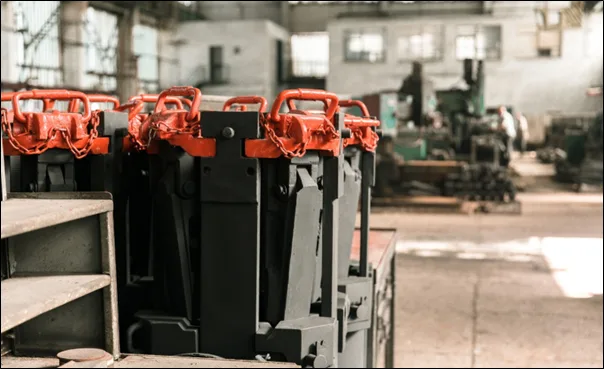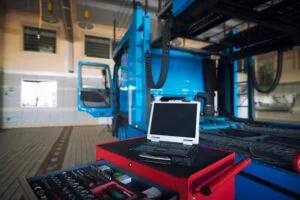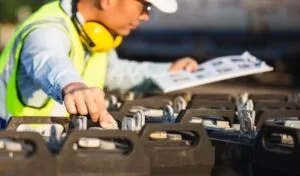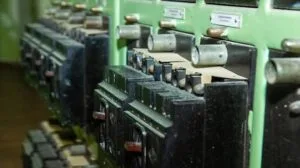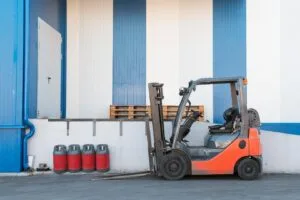Forklifts are essential for many businesses, especially in industries like warehousing, manufacturing, and logistics. These machines work hard to move heavy materials, so it’s no surprise that they rely on powerful batteries to keep them running. But just like any piece of equipment, forklift batteries don’t last forever. Over time, the performance of these batteries can decline, leading to issues that can affect your forklift’s efficiency and your business’s operations.
In this blog, we will explore the impact of battery age on forklift performance, including the signs that indicate your forklift battery may be reaching the end of its life. We will also discuss how to extend forklift battery life with simple maintenance tips and solutions to help you get the most out of your investment. Whether you manage a fleet of forklifts or use them occasionally in your business, understanding battery age is key to maintaining peak performance.
At Industrial Batteries Accessories Ltd., we know that keeping your forklift batteries in top condition is vital to your business’s success. Let’s dive into the important topic of forklift battery age and what you can do to prevent costly breakdowns and downtime.
How Battery Age Affects Forklift Performance
Forklift batteries are designed to be durable, but as they age, their performance naturally begins to decline. The age of a battery affects its ability to hold a charge, how long it can last during use, and how efficiently it powers the forklift. Let’s look at how battery age impacts forklift performance.
1. Reduced Battery Capacity

As forklift batteries age, their capacity to hold a charge decreases. This means that your forklift may not run as long on a single charge, requiring more frequent recharging. The battery may also lose the ability to provide consistent power to the forklift, resulting in slower speeds or weaker lifting capabilities.
2. Longer Charging Times
An aging battery may take longer to charge, reducing the amount of time your forklift is available for use. In some cases, you may find that the battery doesn’t reach a full charge, even after several hours of charging. This can be frustrating and lead to downtime during busy work periods.
3. Increased Maintenance Needs
Older forklift batteries require more frequent maintenance, such as checking for corrosion, topping off electrolyte levels, and ensuring the terminals are clean. If maintenance isn’t kept up, it can lead to further performance problems. In some cases, maintenance can delay the inevitable need for a replacement, but it’s not a permanent solution.
4. Overheating and Damage
As forklift batteries age, they can begin to overheat more easily. This can lead to damage to both the battery and the forklift. Overheating can cause the battery’s internal components to degrade faster, reducing its lifespan even further. It can also affect the performance of the forklift, causing it to slow down or fail to operate as efficiently.
Signs Your Forklift Battery Is Getting Old
If you’re unsure whether your forklift battery is nearing the end of its life, there are several signs to look for. Paying attention to these signs can help you catch problems early and avoid costly repairs or replacements.
1. Decreased Run Time
One of the first signs that a forklift battery is aging is a decrease in run time. If your forklift is no longer lasting as long on a single charge, the battery may not be holding a charge properly. This can lead to more frequent charging and interruptions in your workflow.
2. Slow Charging
If your forklift battery is taking longer than usual to charge, it may be a sign that it’s losing its ability to hold a full charge. Slow charging times often occur when the battery’s internal chemistry begins to degrade.
3. Frequent Need for Charging
If you find yourself recharging the battery more often than you used to, it could indicate that the battery is aging. While all forklift batteries require recharging after a certain amount of use, older batteries typically need to be recharged more frequently.
4. Battery Leaks
Battery leaks are a serious issue that can arise when a battery gets too old. If you notice any leaks, such as fluid seeping from the battery or signs of corrosion around the battery terminals, it’s time to inspect the battery for potential failure.
5. Battery Warning Lights
If your forklift has a battery management system, you may see warning lights on the dashboard that indicate the battery is not performing at its best. This could be a sign that the battery is nearing the end of its lifespan or that it’s experiencing performance issues.
How to Extend Forklift Battery Life
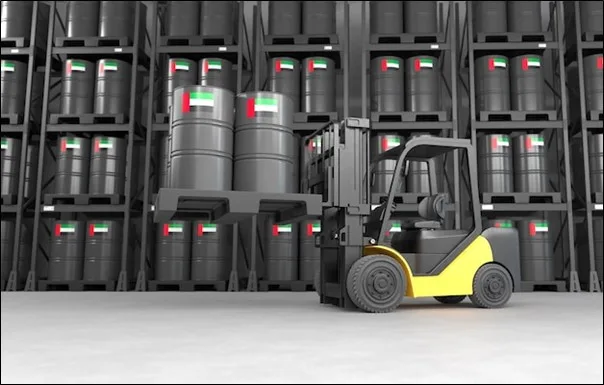
Forklift battery replacement can be costly, so extending the life of your batteries is a smart way to save money and keep your forklifts running smoothly. Here are some tips to help you get the most out of your forklift batteries:
- Regular Maintenance
Regular maintenance is crucial for keeping forklift batteries in good condition. Make sure to:
- Clean the terminals: Over time, corrosion can build up on battery terminals, leading to poor connections. Regularly clean the terminals to ensure the battery is charging and discharging properly.
- Check electrolyte levels: For lead-acid batteries, check the electrolyte levels and top them off with distilled water as needed. This will help prevent battery damage.
- Inspect for damage: Regularly inspect the battery for signs of wear and tear, leaks, or cracks. Early detection can prevent more serious problems down the line.
2. Proper Charging Practices
Improper charging can shorten the lifespan of your forklift batteries. Follow these charging best practices:
- Avoid overcharging: Overcharging can lead to battery overheating, which can damage the battery’s internal components. Use a charger with an automatic shutoff feature to prevent overcharging.
- Don’t wait until the battery is empty: It’s best to charge your forklift battery when it’s around 20-30% discharged, rather than waiting until it’s completely drained. This helps maintain battery health.
- Use the right charger: Make sure you’re using the right charger for your battery type. For example, lithium-ion batteries require different charging methods than lead-acid batteries.
3. Temperature Control
Extreme temperatures can have a big impact on forklift battery performance. Keep the batteries in a temperature-controlled environment to prevent them from overheating in hot conditions or freezing in cold conditions. Ideally, forklift batteries should be kept in a temperature range of 50°F to 80°F (10°C to 27°C).
4. Battery Swapping
If you run a fleet of forklifts, consider implementing a battery swapping system. This allows you to rotate the use of batteries between forklifts, ensuring that each battery gets a break and is used less frequently, which can extend its lifespan.
Solutions When Forklift Batteries Need Replacement
Despite your best efforts, forklift batteries will eventually need to be replaced. Here are some options to consider when it’s time to replace your battery:
1. Invest in Lithium-Ion Batteries
Lithium-ion batteries are becoming increasingly popular for forklifts due to their long lifespan, faster charging times, and reduced maintenance requirements. They can last up to three times longer than lead-acid batteries, making them a great investment for businesses looking to reduce replacement costs.
2. Consider Battery Leasing
For businesses that want to reduce upfront costs, battery leasing can be a great solution. With leasing, you can avoid the large expense of purchasing new batteries and instead pay a monthly fee. This also includes the benefit of having access to the latest battery technology.
Lead-Acid vs. Lithium-Ion Forklift Batteries
| Feature | Lead-Acid Batteries | Lithium-Ion Batteries |
| Lifespan | 1,500-2,000 charge cycles | 3,000-5,000 charge cycles |
| Charging Time | 6-8 hours | 1-2 hours |
| Maintenance | Requires regular maintenance | Minimal maintenance required |
| Initial Cost | Lower initial cost | Higher initial cost |
| Energy Efficiency | Less efficient, power loss over time | More energy-efficient, less power loss |
| Replacement Frequency | Requires replacement every 3-5 years | Can last up to 10 years |
Frequently Asked Questions (FAQs)
Q1: How can I tell when it’s time to replace my forklift battery?
If you notice decreased run time, slower charging, or increased maintenance needs, it might be time to replace your battery. A battery management system warning light or signs of leaks could also indicate battery failure.
Q2: How long do forklift batteries last?
Lead-acid forklift batteries typically last between 3-5 years, while lithium-ion batteries can last 5-10 years with proper care.
Q3: Can I extend the life of my forklift battery?
Yes, you can extend the life of your forklift battery by following proper charging practices, maintaining the battery regularly, and storing it in a temperature-controlled environment.
Q4: Are lithium-ion batteries better than lead-acid batteries?
Lithium-ion batteries tend to have a longer lifespan, require less maintenance, and charge faster than lead-acid batteries. However, they come at a higher initial cost.
Conclusion
Understanding the impact of forklift battery age is essential for maintaining forklift performance and avoiding unnecessary downtime. By recognizing the signs of aging batteries and taking steps to extend their lifespan, you can ensure that your fleet operates at peak efficiency. Regular maintenance, proper charging, and temperature control are key to getting the most out of your forklift batteries. And when it’s time to replace them, consider advanced battery solutions like lithium-ion batteries for better performance and longer lifespan.
At Industrial Batteries Accessories Ltd., we provide high-quality forklift battery solutions to help your business run smoothly. If you have questions or need assistance, don’t hesitate to contact us.

